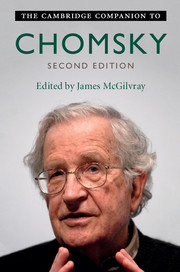Book contents
- The Cambridge Companion to Chomsky
- The Cambridge Companion to Chomsky
- Copyright page
- Dedication
- Contents
- Figures
- Contributors
- Introduction
- Part I The Science of Language: Recent Change and Progress
- Part II The Human Mind and Its Study
- 7 The Influence of Chomsky on the Neuroscience of Language
- 8 Cognitive Science: What Should It Be?
- 9 Semantic Internalism
- 10 Faculties and Modules: Chomsky on Cognitive Architecture
- 11 Chomsky and Moral Philosophy
- Part III Chomsky on Politics and Economics
- Index
- References
11 - Chomsky and Moral Philosophy
from Part II - The Human Mind and Its Study
Published online by Cambridge University Press: 13 July 2017
- The Cambridge Companion to Chomsky
- The Cambridge Companion to Chomsky
- Copyright page
- Dedication
- Contents
- Figures
- Contributors
- Introduction
- Part I The Science of Language: Recent Change and Progress
- Part II The Human Mind and Its Study
- 7 The Influence of Chomsky on the Neuroscience of Language
- 8 Cognitive Science: What Should It Be?
- 9 Semantic Internalism
- 10 Faculties and Modules: Chomsky on Cognitive Architecture
- 11 Chomsky and Moral Philosophy
- Part III Chomsky on Politics and Economics
- Index
- References
- Type
- Chapter
- Information
- The Cambridge Companion to Chomsky , pp. 235 - 254Publisher: Cambridge University PressPrint publication year: 2017
References
- 3
- Cited by

